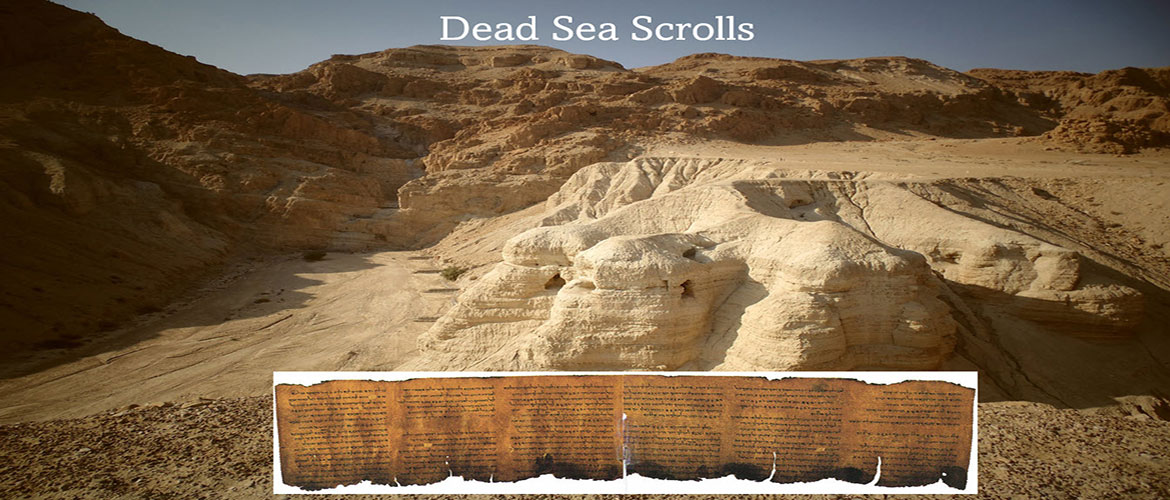
Good weekend to you my “Walking with Jesus” friends,
For many people, at least in America, this will be a long weekend as it includes the “Labor Day” holiday, a day celebrating the value of a strong work ethic and the significance of work in both life and society. Listen to this powerful statement about God’s design for Adam, the first human being: “The LORD God took Adam and put him in the Garden of Eden to work it and take care of it. And the LORD God commanded the man, ‘You are free to eat from any tree in the garden; but you must not eat from the tree of the knowledge of good and evil, for when you eat of it you will certainly die.” (Gen. 2:15-17) Do you find it interesting that while Adam was given great freedom by God, he was also given clear guidance, responsibility and a purpose!
Often weekends are used for trips and this weekend may I invite you to join me on a trip from Jerusalem, down to the Dead Sea, then north along the Jordan river to the Sea of Galilee? If you’ve been with me the past few days, you know I’m in Israel with a group of folks and this weekend we’re making that trip. Perhaps you’ve noticed that whenever the Bible describes someone going TO Jerusalem, from any direction, the word “UP” is always used, do you know why? That’s because Jerusalem in 2475 feet ABOVE sea level, built on the hills of Moriah. The surface of the salty Dead Sea is the lowest place on earth currently at about 1420 feet BELOW sea level! The winding road between the two cuts through the rugged Judean hills which are most often barren. The further from Jerusalem, the drier and more rugged the terrain.
Jesus told a famous story about this rugged road once, as he described a traveler who was accosted by robbers. Looking at the canyons and rugged cliffs pot marked by little caves, it’s very easy to imagine such a tragedy. In our day the popular ‘carjacking’ crime of stealing a car from someone parked at a stop light, might be the modern equivalent. Jesus told the story this way: “A man was going down from Jerusalem to Jericho, when he was attacked by robbers. They stripped him of his clothes, beat him, and ran off leaving him behind half dead.” (Luke 10:30-37) Perhaps you recall Jesus described three different people who came by, on that same road, and saw the bleeding, dying man. The first was a Priest, but seeing the wounded man from a distance actually crossed over to a different path so as to not walk too close and thus he ignored the victim.
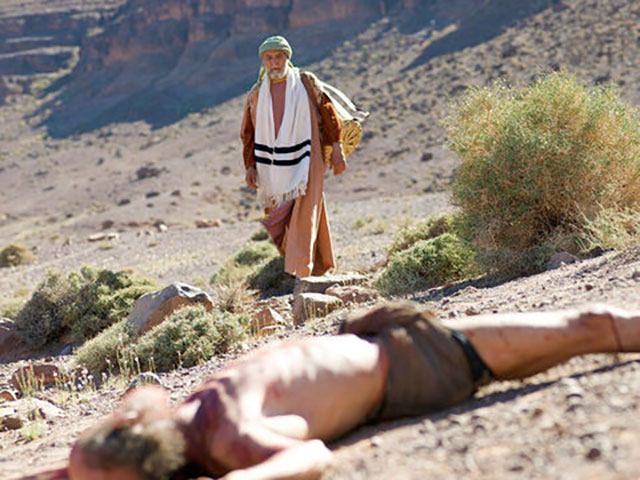
The second was a Levite who amazingly did the same. Both of these men symbolized those religious people held in high esteem who should WANT to help this man victimized by robbers. Jesus then described a third man, a Samaritan and of course all Jews would assume that all Samaritans would do exactly what the Priest and Levite did, for Samaritans and Jews had no interest in helping each other.
But Jesus shocked His audience by saying “But a Samaritan came upon this man and took pity on him. He bandaged his wounds, put the man on his own donkey and brought him to an inn to take care of him.” Jesus went on to say the Samaritan paid the innkeeper in advance, for needs the wounded man might have, promising to return from his travels and see if his payment had been sufficient. Jesus had used this story to illustrate and make practical His great declaration: “Love the LORD your God with all your heart, mind, soul and strength. And love your neighbor as yourself.” I wonder, my friends, what stirs up in your heart and mind when you consider that story in the town where you live today? Would you consider yourself a ‘Good Samaritan’?
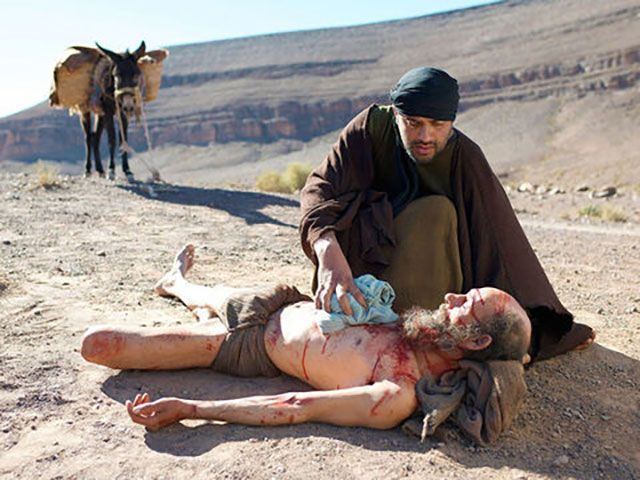
The journey of less than 120km from Jerusalem down to the Dead Sea is a lonely ride with only an occasional Bedouin tent seen out on the rugged Judean countryside. As the descent levels out some rugged cliffs come into view as the Judean hills meet the desert. Look, can you see those caves and the mountain goats standing in the shade of the caves over there? This is the area called Qumran where in 1947 a Bedouin boy was chasing some of his wandering sheep and he threw a stone into one of these caves hoping to chase the sheep out into the open. Instead, the boy heard a strange sound as that stone hit some large clay jars. Far from the daylight, these jars had not been seen in over 2000 years!
Those clay jars contained what we now call the famous “Dead Sea Scrolls”, perhaps the most significant archeological find of all time in giving credibility to the accuracy of the Hebrew Scriptures. Over the next few years fragments from 950 different scrolls were discovered, most of which are ancient copies of Scripture texts. The most complete was the ancient scroll of the prophet Isaiah. A museum in Jerusalem now contains most of them. That museum is itself shaped in the form of the jars in which the scrolls were found.
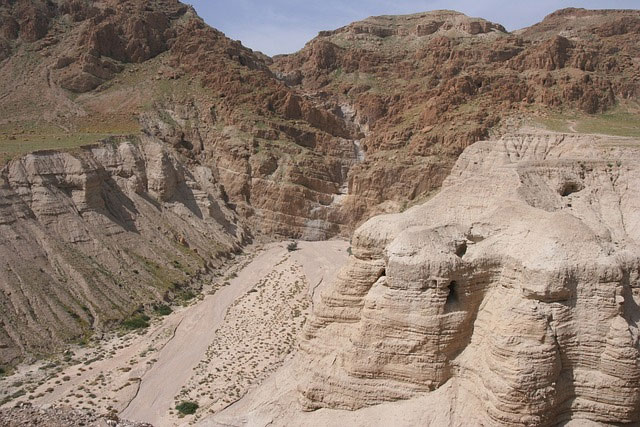
In the time of Jesus, a group of scribes lived among these caves calling themselves Essenes. Living like monks, they lived very simple lives of prayer, meditation, and their daily work was hand copying the Hebrew Scriptures one letter, one word at a time. John the Baptist may have spent some time among them and while we have no record of His visit, it’s very possible Jesus visited these Essenes.
As we continue our drive toward the Dead Sea, suddenly an oasis of palm trees and flowers springs up out of the desert off to our right. This is none other than the oasis En Gedi where David hid from King Saul for a prolonged period as Saul sought to kill him. 1 Samuel 23, 24 gives us the account of King Saul entering one of these caves to relieve himself. David and some of his men were far back in that cave, and they urged David to take advantage of the opportunity and kill defenseless Saul, but instead David crept forward in the dark and cut off a corner of Saul’s kingly robe. Later, after Saul had left the cave and remounted his chariot, David came out of the cave and called out to King Saul asking if the piece of cloth in his hand was possibly cut from the corner of his royal robe?
King Saul was astonished that David had spared his life and shouted these powerful words to David in the hearing of all the fighting men who were with both David and King Saul: “David, you are more righteous than I. You have treated me well, while I have treated you badly… The LORD delivered me into your hand, but you did not kill me… I know that you will surely be king, and the kingdom of Israel will be established in your hands…” (1 Sam. 24:18) This day became a key, defining moment in the life and legacy of David, the most famous of all the kings of Israel. It was from this oasis region, En Gedi, Bible scholars believe David wrote several of the Psalms including Ps. 16; 35; 57; 63; 108.
As we approach the Dead Sea the strong smell of salt penetrates our nostrils, do you smell it? No place on earth is more salty. Nothing living can survive the Dead Sea. This is the region where the ancient story of God’s destruction of Sodom and Gomorrah, with burning sulfur poured down from heaven, took place. (Gen. 18,19) It doesn’t take long here to find your soul longing for fresh water, green grass, flowers and beauty; thus, our journey turns north, following the flowing river called the Jordan, which flows south from the Sea of Galilee to the Dead Sea.
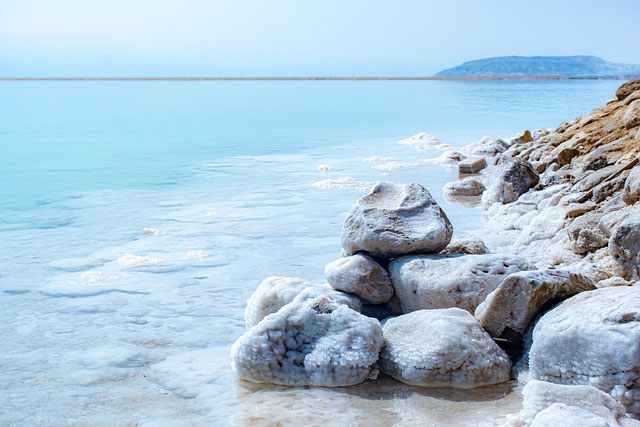
As we drive north, off to our right is the great Jordan river valley with its lush grasslands for sheep and cattle. This is the area where Moses and the next generation of Hebrews camped after having spent 40 years wandering in the desert. Here finally God led Moses up a high mountain to see the land of Promise and Moses died up there. (Deut. 34) Joshua picked up the mantle of leadership and at God’s direction led the Hebrews across the dry Jordan riverbed into the new land, piling up 12 big rocks they had taken from the bottom of the dry riverbed, and building a monument to God’s faithfulness where they spent their first night in the new land, Gilgal. (Joshua 3,4)
Do you remember what God told Joshua to tell the people about this pile of miraculous river bottom rocks? “In the future, when your descendants pass this place and ask their parents: ‘what do these stones mean?’ you tell them Israel crossed the Jordan on dry ground. for the LORD your God dried up the Jordan before you until you had crossed over. The LORD you God did to the Jordan what He had done to the Red Sea…He did this so that all peoples of the earth might know the hand of the LORD is powerful and so you might always fear the LORD your God.” (Joshua 4:20-24)
May I ask my friends, on this great weekend, do you have any stones of remembrance? Anything which reminds you of the great work of God in the history of your family? Have you told the stories to your children and grandchildren? Here’s a song of worship and reflection to help us consider the power of that!
Bible images provided with attribution to www.LumoProject.com.
Have a comment or question about today’s chapter? I’m ready to hear from you, contact me here.

Pastor Doug Anderson
“Let us run with perseverance the race marked out for us, with our eyes fixed on Jesus…” (Heb. 12:1,2)
Archived back issues of “Walking with Jesus” and other resources are available by clicking here to open our ‘home page’ (or go to HOME at upper right of this page).
Share with friends. Subscribe below for daily “Walking with Jesus”.


